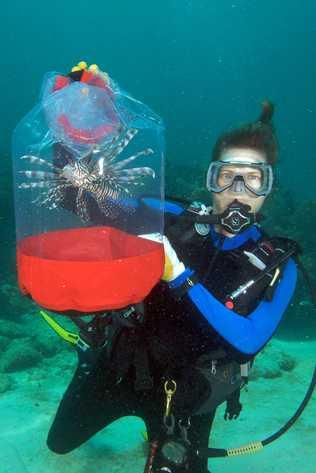
Courtesy of the Miami Herald:
Native to the Pacific and Indian oceans, lionfish are growing in population in the Florida Keys, becoming a menace to the ecosystem and posing a threat to divers in the lobster miniseason.
When thousands of divers and snorkelers take to the waters Wednesday and Thursday for the annual spiny lobster miniseason, they should beware of a new sea invader in the Florida Keys: the venomous lionfish. ``We are concerned because they tend to have the same habitat as lobsters do,’’ said Lad Atkins, an expert on lionfish from Key Largo-based Reef Environmental Education Foundation. The lionfish, which is native to the Pacific and Indian oceans, was first documented in the Florida Keys 1 ½ years ago on French Reef off Key Largo. The invasion started out slowly for the first year, with sporadic sightings. In the past two months, however, Atkins said lionfish sightings have escalated, reaching dozens a day. By the end of the summer, he expects the number of lionfish seen in the Keys to climb to more than 1,000. The prolific breeder and voracious eater with no known marine predators has now been spotted throughout the island chain including in the Dry Tortugas, 70 miles west of Key West. ``I can almost guarantee you go out on any wreck in the Keys and you’ll see one,’’ he said. ``They are everywhere.’’
They also have been spotted in Biscayne Bay and all along Florida’s East Coast.
At the temporary lobster information booth set up for miniseason at mile marker 106 of the Overseas Highway in Key Largo, representatives of the Florida Fish & Wildlife Conservation Commission and Florida Keys National Marine Sanctuary provide information on fishing regulations, no-take areas, boating and diving safety and how to measure a lobster for legal size.
This year the booth with maps, brochures and lobster gauges also includes a large sign with detailed information about the new nemesis of the Keys. It read: ``Attention Divers. We need your help. Be on the lookout for invasive lionfish!’’
``If you have the right gloves and experience handling them, knock yourself out trying to capture them,’’ FWC officer Bobby Dube said. ``But if you don’t, definitely do not attempt to get them.’’
Many tourists who visited the information booth Monday had never heard of the lionfish, a beautiful invader which one nature group said looks like a Las Vegas showgirl and is popular in the aquarium trade.
``Can the lionfish kill you or just make you sick?’’ asked Tanya Reed of Melbourne, who was at the booth with her two boys, ages 9 and 11.
Joy Tatenghorst, who handles outreach and education for the sanctuary, replied: ``They can give you a nasty sting. Their spines are very venomous.’’
PAINFUL EXPERIENCELad Akins of REEF said he is unaware of any reported lionfish stings in the Keys. He’s hoping the education outreach will keep it that way through miniseason.
Although there are no known fatalities involving the lionfish, a sting is very painful and can cause swelling. For some people it also can bring on a severe reaction that needs immediate medical attention.
``It’s like a bee sting times 100,’’ said Akins, who has been stung while collecting lionfish outside of the Keys.
If stung, apply heat. A person should immerse the wound in hot, but not scalding, water until symptoms subside.
``When you’re on a boat, hot water can be a challenge,’’ Akins said. ``But you can use exhaust water out of the engine as a source, or wet a towel or T-shirt on the engine block and wrap it around the stung area.’’
Tatenghorst explained to visitors about the size limits of lobsters and the catch limits of six per day per person during the two-day miniseason, which is the prelude to the regular season that starts Aug. 6.
``But there are no bag limits or catch limits for lionfish,’’ Tatenghorst said.
The fish, which can grow up to 20 inches, is such a menace to the marine ecosystem gobbling up native reef fish, crustaceans, grouper, snapper and shrimp like a Sumo wrestler at a buffet that sanctuary officials are even allowing people who go through a workshop and get a special permit to remove them out of sanctuary preservation areas with hand nets.
`YOUR COMPETITION’``I’ve been telling fishermen: Lionfish are your competition,’’ said Karrie Carnes, spokeswoman with the sanctuary.
No permit is required to remove lionfish from the general-use area of the sanctuary. Spears may be used to capture lionfish where spearfishing is allowed. Hand nets may be used to capture them where hook-and-line fishing is allowed.
The typical gloves used for picking up lobster are not appropriate for picking up lionfish with its long venomous spines. Gloves should be like the ones used in hospitals to prevent needle punctures.
During the day, lionfish are usually not in the open. They prefer to rest underneath ledges and overhangs.
``So if you see an antenna of a lobster and reach in, there could be a lionfish resting in the same area,’’ Akins said. ``They can be very well camouflaged.’’
Lionfish also aren’t usually aggressive.
Thirteen dive shops and organizations across the Keys will serve as collection banks for lionfish during miniseason. They are listed at
www.reef.org/lionfish.
Divers and snorkelers who simply want to report lionfish sightings can do so by calling hot-line numbers 1-305-852-0030 or 1-305-395-8730.
At a recent workshop, Akins said humans are good at wiping out other fish and are basically the only hope to slow down the lionfish invasion, which now is a concern for the entire Caribbean basin and Gulf of Mexico.
It is an uphill battle. Females can release 30,000 eggs every four days, and their gelatinous egg masses are believed to contain a chemical deterrent that may be unsavory for predators.
But for humans, lionfish are not poisonous to eat and are actually quite tasty.
``They are very good to eat,’’ Akins said. ``They’re a delicacy taste like hogfish.’’
Read more:
http://www.miamiherald.com/2010/07/27/1747742.html#ixzz0uthqWA00